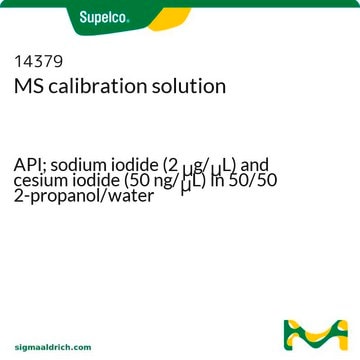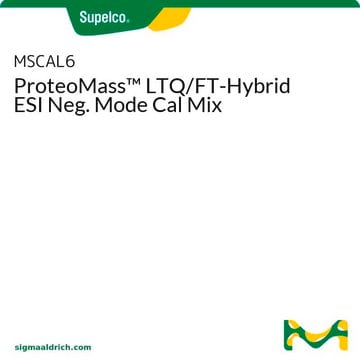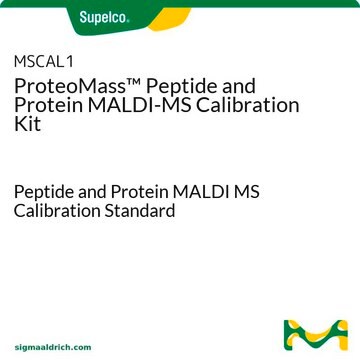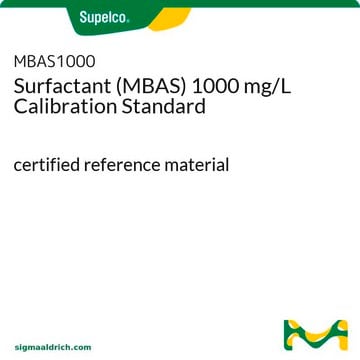MSCAL5
ProteoMass™ LTQ/FT-Hybrid ESI Pos. Mode Cal Mix
Select a Size
Select a Size
About This Item
Recommended Products
product line
ProteoMass™
Quality Level
CofA
current certificate can be downloaded
packaging
pkg of 1 × 10 mL
storage condition
protect from light
concentration
(varied conc.)
technique(s)
mass spectrometry (MS): suitable
format
multi-component solution
shipped in
dry ice
storage temp.
−20°C
Looking for similar products? Visit Product Comparison Guide
General description
Application
Features and Benefits
- Ready-to-use
- Developed and qualified specifically for use with the LTQ based Thermo Scientific hybrid instruments (LTQ FT, LTQ FT Ultra, and LTQ Orbitrap series) with ESI source and Thermo Scientific Exactive
- Conveniently packaged, freeing you from time consuming mixing and dilution steps, allowing you to focus on the acquistion of quality data
Legal Information
Not finding the right product?
Try our Product Selector Tool.
Signal Word
Danger
Hazard Statements
Precautionary Statements
Hazard Classifications
Acute Tox. 3 Dermal - Acute Tox. 3 Inhalation - Eye Irrit. 2 - Flam. Liq. 2 - STOT SE 1
Target Organs
Eyes,Central nervous system
Storage Class Code
3 - Flammable liquids
WGK
WGK 2
Flash Point(F)
42.1 °F - closed cup
Flash Point(C)
5.6 °C - closed cup
Choose from one of the most recent versions:
Certificates of Analysis (COA)
Don't see the Right Version?
If you require a particular version, you can look up a specific certificate by the Lot or Batch number.
Already Own This Product?
Find documentation for the products that you have recently purchased in the Document Library.
Customers Also Viewed
Our team of scientists has experience in all areas of research including Life Science, Material Science, Chemical Synthesis, Chromatography, Analytical and many others.
Contact Technical Service








![[Glu1]-Fibrinopeptide B human ≥90% (HPLC)](/deepweb/assets/sigmaaldrich/product/structures/122/537/7ead5c32-cb67-4325-9ce7-66c8dec24bdd/640/7ead5c32-cb67-4325-9ce7-66c8dec24bdd.png)





